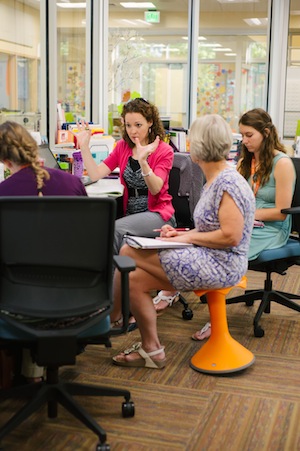The administrator’s job is to help teachers be their best. How is this accomplished? What steps should be taken? Administrators need to ensure they are developing a culture that includes attributes related to the desired behavior or outcome. For example, we ask teachers to have growth mindsets. Do we allow them to exert the actions of someone with a growth mindset?
Robert Brooks, one of the leading authors in the areas of mindset, motivation, and school climate, has defined mindsets as the assumptions and expectations we have for ourselves and others that guide our practices and interactions with others. Furthermore, in his book Understanding and Managing Children’s Classroom Behavior: Creating Sustainable, Resilient Schools, he describes the characteristics of the mindset of effective educators and ways to cultivate this mindset in our staffs. According to Brooks, effective educators:
- Understand the lifelong impact they have on students
- Believe that all students yearn to be successful; if a student is not learning, educators must ask how they can adapt their teaching style and instructional material to meet student needs
- Appreciate that the foundation for successful learning comprises a safe and secure classroom climate and an authentic relationship between teacher and student
- Realize that the fear of making mistakes and feeling embarrassed or humiliated are obstacles to learning

These statements could be refocused on the administrator and their staff to show the mindset of an effective administrator. For example, an effective administrator understands they have a lifelong impact on staff. An administrator believes that all teachers yearn to be successful and if a teacher is not growing, the administrator must ask how they can adapt their feedback and support to meet the needs of teacher. You can do this for each of the characteristics above and realize that an administrator must have a growth mindset if they expect their staff to be continuous learners.
Taking the time to identify your mindset is an important step toward cultivating a culture of growth in your school. For example, do you believe-and show-that the foundation for growth and a safe and secure school is the relationship the administration forges with staff? I suggest taking the time to read the characteristics above and change them into questions to survey yourself and come up with next steps. Then you can nurture this mindset in your school.
One way that Robert Brooks suggests nurturing a growth mindset is to ask staff, “Do you believe developing a positive relationship with our students enhances or detracts from teaching academic material?” I would suggest taking this a step further by also asking staff, “Do you believe developing a positive relationship with your grade-level or content team enhances or detracts from teaching and learning?” Then, ask them to give concrete examples of how they build relationships with their students and colleagues. This second step is necessary because we sometimes might believe we feel a certain way and say we do, but our actions do not support what we believe and say. Once you have the initial discussion about mindsets and a positive school culture, a growth mindset must stay as a priority. This can be done by dedicating a portion of every professional learning opportunity to cultivating a growth mindset or discussing its impact on learning.
When you establish a growth mindset in your staff, you have to be receptive to the ideas they are putting forward. You need to be open to that sort of dialogue. Otherwise how can you ask them to put it in play in their classroom? Is your staff afforded the opportunity for teacher-centered professional learning? This lends itself to teachers having student-centered learning in their classroom. Administrators must model and guide the practices they want to see.
The way administrators see and handle evaluation says a lot to teachers. It is important in a culture of growth that the administration models and frames evaluation as an instrument or tool to support the staff’s growth. Staff should receive specific feedback regarding the area in which they want and need growth to be a more effective educator. If administrators model this consistently, teachers will carry this practice back into their classroom. Therefore, teachers will see student evaluation through this lens also. They will use assessment to guide student growth by means of descriptive feedback and next steps for support.

The complexity of maintaining a positive relationship while fostering continuous improvement is evident in the teacher evaluation process. The hope is that administrators understand the emotional attachment that teachers have to being evaluated and remember to focus on growth for teachers while keeping the relationship positive. We need to model how to care for someone while teaching them. If we model caring coupled with teaching, teachers will teach this way. In an article in Principal Magazine, Adam Saenz says that the golden nugget for a staff’s emotional well-being is administrators who model the practice of emotional intelligence. Before the evaluation process begins, make sure you know your staffs’ areas of interest and growth. Give teachers a chance to provide input on their learning to cultivate a staff of continuous learners. You might also ask your teachers these questions or think about these questions at the beginning of the evaluation process.
- As a professional, where do you feel that you excel? (Start with the teacher’s strengths).
- Is there an area of professional learning that you are interested in pursuing? (This will help guide work, observations, and goal setting.)
- What are your learning goals for you and your students? (This question could lead to their formative feedback and summative goal for evaluation purposes.)
- In what area of teaching and learning do you feel you can grow? In what area of our plan for continuous improvement do you need support? Which of our schoolwide goals do you feel would be the most difficult for you and your students to accomplish, and why?
If you know the teacher well and you know through their actions that they do not believe that all students can learn you can ask them, “Do you believe that all students can learn?” If they say yes, ask them why they believe this and what, in their words and actions, shows this belief. This will tell you a lot about their mindset about learning for themselves also.
As you think through these questions and ways to provide professional development opportunities that promote a growth mindset, you might find inspiration in this TedX talk by Sheryl Chard titled No More Bad Coffee: Professional Development That Honors Teachers. If you have additional resources that have helped you develop a growth mindset in your staff, please share them in the comments.
